The crying man
(AFP Photo / Sakis Mitrolidis)
THESSALONIKI, Greece, July 7, 2015 – I knew it would be a hard week, possibly the hardest in six long years of this crisis. On the Saturday Prime Minister Alexis Tsipras had called a surprise referendum on the international bailout for Greece. Two days later, as fearful Greeks rushed to empty their accounts, the country’s banks were closed to save them from collapse.
Each morning I was outside the banks at 6.30 am, taking pictures as pensioners queued and pushed each other, many losing their temper at me for photographing them. These were people tired from so many years of working, and now this.
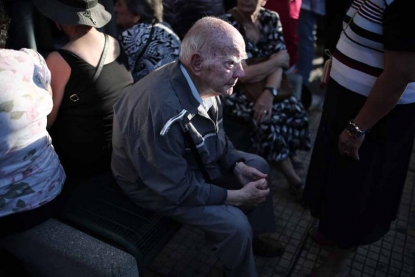 Pensioners wait outside a national bank branch in Thessaloniki on July 3, 2015 (AFP Photo / Sakis Mitrolidis)
Pensioners wait outside a national bank branch in Thessaloniki on July 3, 2015 (AFP Photo / Sakis Mitrolidis)It was Friday, day five of the bank closure. As usual, I was outside a national bank branch where 50 to 60 elderly people had gathered. Few Greek pensioners have credit cards – many are nervous about ATMs, and feel safer dealing in person with a cashier. That’s why the government had allowed some bank branches to reopen so retirees could withdraw part of their pensions in cash.
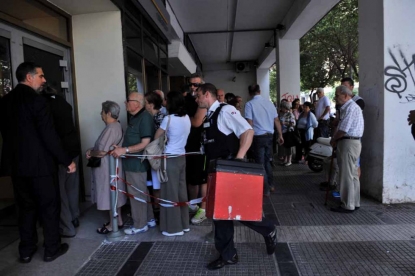 A security guard carries a case with cash as pensioners queue outside a national bank branch in Thessaloniki on July 3, 2015 (AFP Photo / Sakis Mitrolidis)
A security guard carries a case with cash as pensioners queue outside a national bank branch in Thessaloniki on July 3, 2015 (AFP Photo / Sakis Mitrolidis)I was there taking pictures from 6.30 to 8.00 am when the doors opened and the queue started to dissipate. I was ready to leave when suddenly a man emerged from the bank yelling and gesturing, holding in his hand a savings book and his ID card.
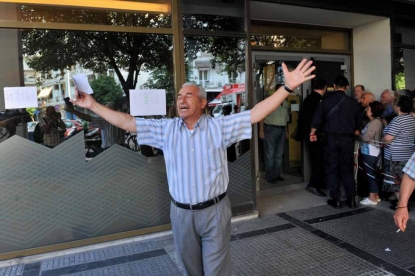 (AFP Photo / Sakis Mitrolidis)
(AFP Photo / Sakis Mitrolidis)Immediately I picked up my camera and started shooting. The poor man. After seconds he collapsed to the ground and started weeping. Together with some fellow reporters from a TV channel, we approached and asked him what was upsetting him so.
The 77-year-old Giorgos Chatzifotiadis told us a story that is by now well-known: he had already queued at three banks in Thessaloniki in hope of withdrawing 120 euros of a pension on behalf of his wife. When he was turned away at a fourth, he broke down.
We returned together to the bank and asked an employee to see to his problem. Fortunately they were able to help him.
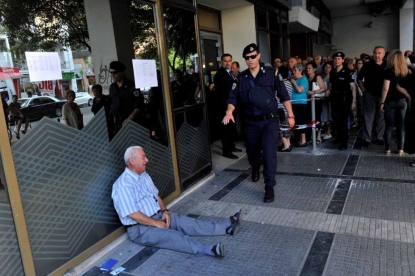 (AFP Photo / Sakis Mitrolidis)
(AFP Photo / Sakis Mitrolidis)"I see my fellow citizens begging for a few cents to buy bread,” he told me afterwards. “I see more and more suicides. I am a sensitive person. I cannot stand to see my country in this distress. That's why I feel so beaten, more than for my own personal problems.”
Back in my office, when I saw the pictures on the monitor, I understood this was a powerful series. The composition, the papers scattered beside him, the policeman coming to help, the people watching as they queued, and the old man himself.
I sent up the images early morning and by noon - judging from the response on Greek websites - I could already see their impact. I must say I was not expecting a huge success, and I was surprised.
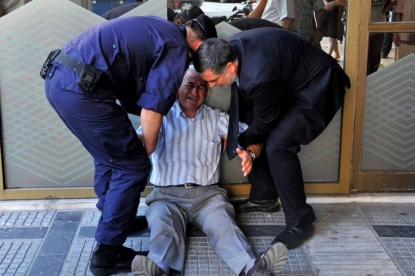 (AFP Photo / Sakis Mitrolidis)
(AFP Photo / Sakis Mitrolidis)Late that evening the Athens office told me the picture had gone viral. It was the first time I experienced something like this, and I admit feeling proud. But part of me felt worried too. On the eve of a crucial referendum the force of this image had the potential to affect people emotionally, and influence them one way or another.
But at the end of the day, it’s my job to inform people and let them draw their own conclusions.
The following day I tried to track down Mr Chatzifotiadis but he had already left the city. Instead I spoke with his daughter over the phone. She told me she was deeply moved and saddened on behalf of her father. She told me he and his wife had worked hard, for many years, as emigrants to Germany. They returned to Greece a few years ago as pensioners to be near their children and grandchildren.
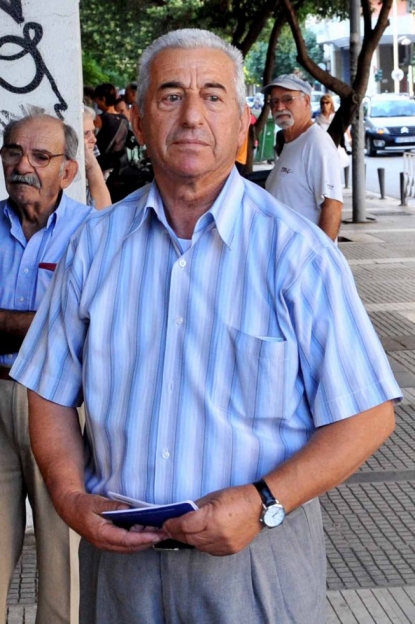 (AFP Photo / Sakis Mitrolidis)
(AFP Photo / Sakis Mitrolidis)I understood this was a decent family and I can say I felt sympathy for this gentleman. I too have many relatives who worked and still work in Germany. They left the country in the 1960s because of poverty, and went there to find a better life, as young people do now. Thessaloniki may be Greece’s second largest city but it also harbors unemployment and poverty on a large scale.
Some people have suggested it is THE defining picture of the Greek crisis. I don’t see it that way. I think it tells part of the story. There have been many amazing pictures, these past few days and these past six years, taken by photographer colleagues – among them Aris Messinis and Louisa Gouliamaki from AFP in Athens who have supported me all these years.
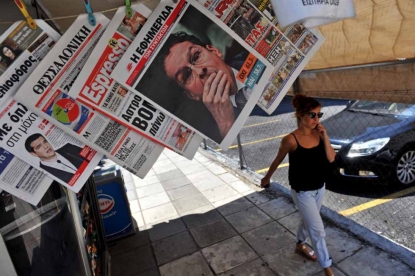 A woman passes a newspaper kiosk with headlines showing the results of Greece's referendum, in Thessaloniki, on July 6, 2015 (AFP Photo / Sakis Mitrolidis)
A woman passes a newspaper kiosk with headlines showing the results of Greece's referendum, in Thessaloniki, on July 6, 2015 (AFP Photo / Sakis Mitrolidis)Since this shot was published I received calls and emails from around the world, most of them very kind and encouraging. There was also an email from someone in Germany who told me my picture did not reflect reality, and that the Greek crisis was provoked by the media.
Immediately came to mind the answer Pablo Picasso gave to a Nazi officer who asked him, looking at a photograph of ‘Guernica’: “Did you do that?” “No,” Picasso is said to have replied. “You did.”
Ultimately, this crisis is really one we Greeks are experiencing every day. There are many stories out there which do not get tremendous coverage in the media, but which each day are hurting and exhausting our proud but hopeful nation.
Sakis Mitrolidis is an AFP photographer based in Thessaloniki. This post was edited by Emma Charlton.


